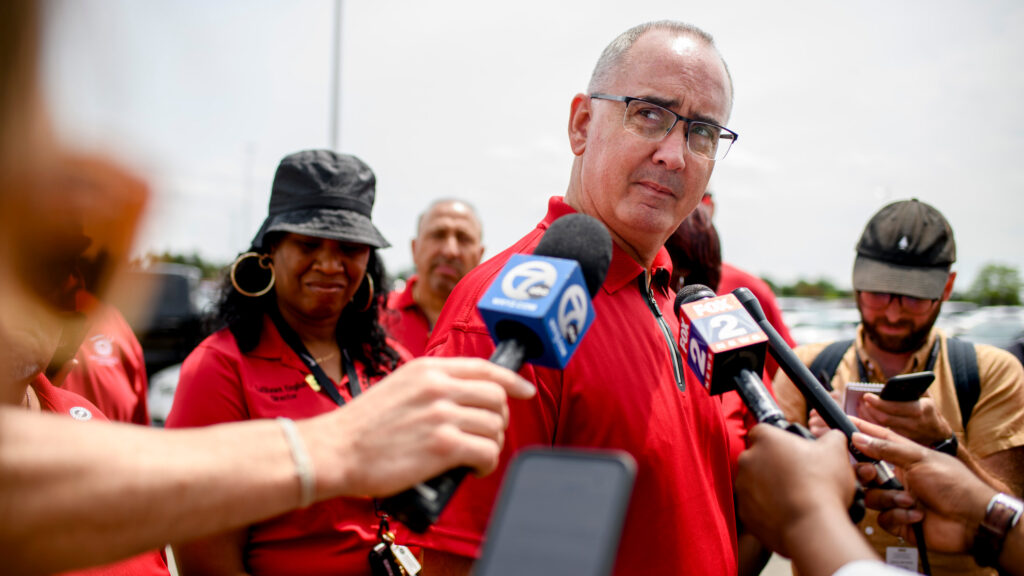UAW Foreign Policy

I was quite surprised when the United Auto Workers leadership came out to demand a ceasefire to Israel’s war-crimes in Gaza. This is a long ways from the AFL-CIA days of the Cold War when the unions were working with Eisenhower or Nixon to overthrow democratically elected governments in Guatemala and Chile, just to think of two notorious cases.
Three key proponents of the UAW’s decision to oppose Israel’s assault on Gaza told me the cease-fire call will be followed by an internal audit to see if the union’s assets are tied up in Israeli bonds. More broadly, the same late November executive-board vote to endorse the cease-fire also created a political-education panel, the Divestment and Just Transition Committee, which, among other things, will examine the size, scope and impact of the US military-industrial complex that employs thousands of UAW members and dominates the global arms trade.
The committee will “think about what it would mean to actually have a just transition, what used to be called a ‘peace conversion,’ of folks who work in the weapons and defense industry into something else,” said Brandon Mancilla, director of the UAW’s Region 9A, representing 50,000 active and retired workers in New York, New England, and Puerto Rico. “And what that means is a big question. No one has solved that question.”
The group is a long way away from offering answers. But its members know they want to preserve jobs and wages in the factories whose production lines might be put to a different use than making bombs and artillery.
Just as tellingly, few in respectable foreign-policy circles consider the size of the US defense industry a problem to be solved. That’s a measure of how underrepresented the working class is in US foreign policy, no matter how much the defense contractors and the politicians they purchase talk about overpriced fighter jets and irrelevant ship designs in terms of jobs. America’s quest for global dominance primarily serves the interests of giant corporations that suppress labor movements worldwide. “I don’t see the interests of the working class being served in most aspects of US foreign policy, if at all,” said Mike Miller, director of UAW Region 6, representing workers in nine western states, who worked with Mancilla to get the union on board with the cease-fire.
Beyond the long-term step of reexamining defense production, they’ve begun conversations with unions overseas to put solidarity into practice. And that holds out hope for the UAW, like that of the revitalized labor movement more broadly, becoming a crucial, missing counterweight to elite foreign policy.
While US politicians from both parties cover it in euphemism, the proper role they see for the working class in foreign policy is as fodder for factories and battlefields, valorized in rhetoric to obscure their exploitation. Dan Vicente, another force for the cease-fire, saw it up close in a Marine Corps logistics battalion during the 2011 Libya war and the terminal phase of the Iraq occupation. Now, as director of Region 9, he represents 18,000 active and 35,000 retired workers in New Jersey, Pennsylvania, and central and western New York.
“You get there and you realize, oh, these people are poor as shit,” Vicente said. “You got a poor shithead from Philly fighting a poor shithead from fucking, I don’t know, Najaf or somewhere [else] in Iraq. It’s an endless cycle of people who don’t have shit being forced to fight people who don’t have shit.”
Mancilla, Miller, and Vicente all described the push for a cease-fire as emerging from the union’s grass roots. “The minute the war began, our members took to the streets across different locals and units,” Mancilla said. Vicente’s wife is Palestinian, and he credits her with educating her about life in the illegally occupied West Bank. Locals 2865 and 5810 backed deescalation as early as October 28. Miller and Mancilla’s regional groups backed a cease-fire before they all took the issue to the UAW’s international executive board at the end of November. By contrast, Democratic voter opposition to the war is growing, prompting Biden to pantomime criticism of Israel while keeping US weapons flowing there. A foreign policy emerging organically from the working class is likely to be not just more broadly beneficial and far more durable.
The UAW regional directors all say the union’s recent foray into geopolitics is just a start. They also all recognize strong differences of opinion amongst the workers they represent. Miller estimates that close to 40 percent of the autoworker membership voted for Trump in 2016. “Economic nationalism,” he said, constitutes a potent force within a union that’s looking to promote the interests of workers worldwide.
Now, this might be getting out in front of the membership. It probably is. But workers respond to leadership. This is the kind of political messaging and work we’ve been wanting within unions for decades. I don’t know to what extent, if any, members will follow leadership here. But at least there is an attempt to reshape American policy in every part of the world to support working class interests. This was Walter Reuther’s goal. And it is Shawn Fain’s too. Reuther didn’t always win his internal battles to get workers to follow him on, say, civil rights. But the UAW of that era still did more for justice than other similarly large industrial unions. So good for Fain. This is part of reclaiming the UAW legacy.


